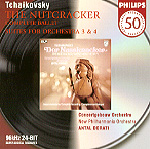Antal Dorati’s Mercury recordings helped put him on the map as a Tchaikovsky conductor and his years as a ballet conductor helped him win a similar reputation for now-classic recordings of major ballets. Both sides of Dorati and Tchaikovsky are on display in this welcome Philips 50 reissue. The Nutcracker, made in 1975 with the Concertgebouw, is a delight, with some terrific orchestral playing (especially the winds) and springy rhythms. It’s been around in one form or another since it was made and was last sighted on a Philips Duo. That release is effectively superceded by the enhanced sound of this one, which employs a mixdown from 24/96 digital remastering that’s supposed to improve over conventional CD sound. Sometimes it does, sometimes it doesn’t; but in this case the orchestra is fuller, more detailed, more involving.
To a slightly lesser extent, the same applies to Suites Nos. 3 and 4, the best of the four Suites for Orchestra Tchaikovsky composed between 1879 and 1887. Originally recorded for Mercury in 1966 and now an audiophile collector’s item, all four suites were available in fine remasterings as another Philips Duo collection. Here’s hoping Philips restores the first two to circulation, but the current pairing also makes sense, for the Suites often sound like ballet scores, full of danceable rhythms and catchy melodies. Suite No. 3 opens with a nostalgic Elegy before moving on to a lilting melancholy voice of the kind Tchaikovsky could write in his sleep. Then, after a bright Scherzo comes a final Theme and Variations movement as long as the first three movements combined. Tchaikovsky’s virtuoso writing, including an extended solo part for violin here played with lovely tone by Hugh Bean, helps make it the finest of the lot. Suite No. 4 is based on Mozart works, ending with a Theme and Variations that includes prominent solo turns for clarinet and violin. Everybody knows the Nutcracker, which has become a seasonal standby for the little tykes and their beleaguered parents, but the Suites’ comparative obscurity always has puzzled me. Perhaps this fine reissue will win them more friends. [6/14/2001]
































